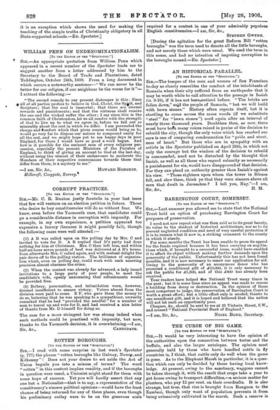AN HISTORICAL PARALLEL.
[To THE EDITOR OF THE "SPECTATOR.")
SIR,—The temper of the men and women of San Francisco to-day so closely resembles the conduct of the inhabitants of Samaria when their city suffered from an earthquake that it may be worth while to call attention to the passage in Isaiah (ix. 9-10), if it has not been.noticed before. " The bricks are fallen down," said the people of Samaria, " but we will build with hewn stones." History often repeats itself, but it is startling to come across the same words (if we substitute "steel" for "hewn stones ") used again after an interval of nearly three thousand years. Doubtless then, as now, there must have be& many voices raised in praise of the decision to rebuild the city, though the only voice which has reached our ears is one of unsparing condemnation for "pride and stout_ ness of heart." But those who are in sympathy with an article in the Spectator published on April 28th, in which not. only the courage but the wisdom of the decision to rebuild is commended, need not be disturbed by the thought that Isaiah, as well as all those who regard calamity as necessarily a punishment for sin, would have disapproved of that decision. For they can plead an authority greater than Isaiah's against his view. "Those eighteen upon whom the tower in Siloam fell, and slew them, think ye that they were sinners above all men that dwelt in Jerusalem ? I tell you, Nay."—I am,










































 Previous page
Previous page